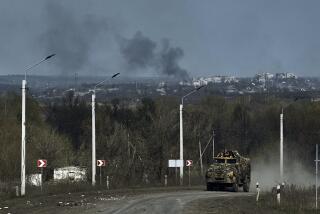CIA Races to Assess the Soviet Collapse : Intelligence: 10 major reports are due in 3 weeks. Baker’s itinerary also reflects a stepped-up effort to keep up with fast-changing events.
- Share via
WASHINGTON — CIA Director Robert M. Gates announced Wednesday that he has launched a crash program to produce 10 major intelligence reports on the Soviet republics in the next three weeks--an attempt to foresee new threats to U.S. security that could stem from the collapse of the Soviet Union.
At the same time, Secretary of State James A. Baker III announced plans to visit the nuclear-armed republic of Belarus (formerly Byelorussia), as well as the secessionist Ukraine later this month, his first official mission to those areas.
Both moves reflect a stepped-up effort by the Bush Administration to catch up with the headlong pace of change in the Soviet Union and to help stabilize the transfer of power from the central government of Soviet President Mikhail S. Gorbachev to the republics, officials said.
“There is no precedent in history for an empire as vast as that of Russia or the Soviet Union imploding so suddenly,” Gates told CIA officers in his first major speech as director of Central Intelligence. “The demise of far smaller, far younger empires previously has shattered the peace.
“We must mind the lessons of history when empires collapse and forewarn of the dangers as well as the opportunities. . . ,” he said. “To this end, we have undertaken an unprecedented effort to gather information from throughout the lands of the former Soviet Union in order to assess the political, economic, social and military reality.”
He said the agency will produce 10 “national intelligence estimates”--major reports on fundamental issues--a number that other CIA officials agreed is unprecedented in such a short time. The agency normally produces a total of about 30 such reports a year--on all subjects worldwide.
Gates also said that the focus of CIA intelligence-gathering in the Soviet Union has shifted, from monitoring the Soviet armed forces to trying to understand the political and economic situation in the disintegrating country, especially in the newly independent republics.
“Already, analytical resources on the Soviet military have been reduced from 15% to 25% in some agencies,” he said, referring to the Pentagon’s Defense Intelligence Agency and the National Security Agency--which runs U.S. electronic eavesdropping efforts--as well as the CIA.
Baker’s itinerary also reflects growing U.S. interest in direct ties to the republics--but, more immediately, growing U.S. concern about control of the Soviet nuclear arsenal.
By visiting both the Ukraine and Belarus, Baker will establish links with all four Soviet republics with nuclear weapons on their territory. He also plans to meet with Boris N. Yeltsin, president of the Russian Federation, and he visited nuclear-armed Kazakhstan in September.
The United States wants the republics to maintain some kind of central authority over the nuclear weapons. Leaders of all four republics have agreed, but no firm arrangements have been worked out.
In his speech, Gates--an expert on the Soviet Union who took office last month--charted a broad plan for changes in the U.S. intelligence community to match the transformed international scene. He said President Bush has ordered the most intensive examination of U.S. intelligence needs since 1947, when the CIA was founded.
“The Soviet military threat and the confrontation of the Cold War still . . . underpins our strategy, our budget and our thinking,” he said. “While we cannot neglect the continuing awesome power and potential of Soviet strategic (nuclear) forces . . . now is the time fundamentally to review our priorities for the future.
“The intelligence community already has reduced its projected budget over the next several years by billions of dollars,” he said. “(The) CIA has begun a projected reduction in personnel of 15% by attrition over the next several years.”
Gates offered no specific budget figures. The U.S. intelligence budget is secret, but it is believed to exceed $30 billion a year.
He outlined several specific initiatives, including:
* Streamlining the management of intelligence agencies and reducing duplication of efforts.
* Increasing focus on “human intelligence”--information gathered from agents, rather than satellites or electronic intercepts--because of its importance in such concerns as weapons proliferation, terrorism and drug trafficking.
* Providing intelligence instantly, through electronic linkups, to policy-makers in the White House and elsewhere.
* Improving reporting on criminal activities that are detected by CIA intelligence efforts. In the past, the agency has been accused of ignoring crimes committed by foreign agents who provided information.
More to Read
Sign up for Essential California
The most important California stories and recommendations in your inbox every morning.
You may occasionally receive promotional content from the Los Angeles Times.











